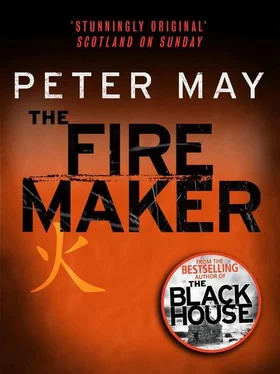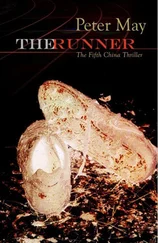‘A vegetarian?’ Qian suggested.
‘Possibly.’ Li let his eyes wander over all the different jars and cans and packs of food in the cupboard. There certainly didn’t seem to be any meat, or meat products. There was something else missing, something obvious only because of its absence. But it still took him a few moments to identify it. ‘No rice either,’ he said.
‘Maybe he ran out,’ Qian said.
‘Maybe he did.’
They went into the bathroom. Like the kitchen it was a mess. Old tubes of toothpaste, creams and ointments cluttered the shelf above the sink. The mirror was spattered with soap and shaving foam. A bloodstained safety razor that had been less than safe lay in a sink which had a ring of grime around it. Used towels were draped over the side of the bath which was ringed, too, with filth, like the contour of scum left by polluted seawater when the tide retreats. Li removed a glove and felt the towel. There was still a hint of dampness in it.
Qian opened a small cabinet on the wall, and cardboard boxes and plastic tubs rattled out and on to the floor. He stooped to pick them up, replacing them one by one. Li looked over his shoulder. There were drugs of some kind, commercially packaged Western medicines with strange and exotic names: Epivir, AZT, Crixivan ; and a whole range of traditional Chinese and herbal medicines. ‘Either he was a health freak or a hypochondriac,’ Qian said.
‘Or sick,’ said Li. ‘Like the elevator man said.’
Qian closed the cabinet and they went through to the first bedroom where one of the forensics men had found Chao’s needle set. It consisted of a hypodermic, a metal spoon, a length of nylon cord, a small sachet filled with white powder. They were contained within a tarnished and battered metal box, which bore the scars of time and travel. It was significant, Li felt, that it had not been in Chao’s possession when they found him.
There were mirrors all around the walls, including one full length at the foot of the bed. The bed was unmade, and a dresser was covered in jars of cream and powder, lipstick, eye make-up, perfumes, lotions and potions of every kind. Qian surveyed them with distaste. ‘It’s like a whore’s bedroom,’ he said. And almost as if to bear him out, when he opened the wardrobe he found it hanging with black and red silk dressing gowns hand-embroidered with dragons and butterflies. In the drawers there were silk pyjamas, exotic male underwear, thongs and g-strings. There were suspenders and stockings, women’s shoes, a short leather whip with three tails. ‘This guy really was sick.’ Qian looked around the room. ‘God knows what must have gone on up here with that procession of young boys.’
They left the forensics man dusting for prints and went through to the other bedroom. By comparison it was neat and tidy. The bed was made up with clean sheets. It didn’t look as if it had been slept in recently. The wardrobe was hung with rows of dark suits and pressed white shirts. Beneath them a row of polished brown and black shoes on a rack. In the other bedroom they had just seen the private face of Chao Heng. In this one they saw the face he showed in public. Two different faces, two different people. Li wondered which, if either, was the real Chao Heng. And how many people, if any, knew who that was?
Perhaps a third face revealed itself in Chao’s living room. Here was a comfortable, stylish room tastefully furnished with items of traditional Chinese lacquered furniture, many of them antiques; low tables inset with mother-of-pearl, hand-painted screens subdividing the room, embroidered silk throws draped over low settees. Three walls were hung with original scroll-mounted paintings, the fourth groaned with books from floor to ceiling. Books of every description in Chinese and English. Classic fiction in both languages: from Cao Xueqin’s A Dream of Red Mansions , and Ling Li’s Son of Heaven , to Scott’s Redgauntlet , and Steinbeck’s The Grapes of Wrath . A veritable library of scientific textbooks: Plant DNA Infectious Agents, Risk Assessment in Genetic Engineering, Plant Virology, Genomic Imprinting . Books on health: The Classified Dictionary of Traditional Chinese Medicine, Chinese Acupuncture and Moxibustion, Fighting Drug Abuse with Acupuncture .
Qian whistled in amazement. ‘Can any one person read that many books in a lifetime?’
Li picked one out at random, Gene Transfer in the Environment , and examined the spine. ‘Chao Heng apparently,’ he said, slipping the book back into the bookcase.
In the far corner of the room there was an illuminated fish tank, multicoloured tropical fish zigzagging through a meticulously recreated seabed, air bubbling constantly up through the water from an oxygen feed. Tins of fish feed were stacked on a small table beside it. Li picked one up. It was half full. He sprinkled some feed on the water and watched the fish peck at it in desultory fashion as it fell slowly to the bottom of the tank. He wandered out on to the glassed balcony. It was north-facing, so no hotter than the rest of the house. There were two comfortable armchairs and a low table with a single, empty bottle of beer on it, an ashtray with half a dozen cigarette ends and a pack of Marlboro cigarettes. Li picked up the pack. There were ten or more cigarettes still in it. He replaced it on the table. With the angle at which the light was striking the bottle, he could see smears of greasy fingerprints all over the dark glass. It was strange, he thought, how dead people left physical traces behind them long after they were gone. This apartment would be filled with vestiges of the oily residue left by Chao Heng’s fingers on everything he touched. A touch that was uniquely his. Or hair gathered in the drainer in the sink and the bath, caught on combs and brushes. The fine dust of his dead skin shed over years would lie like a hidden snow among the fibres of the carpet and the bed, and in ledges along undusted surfaces. His scent would linger in the weave of the clothes that hung in the wardrobes. His personality, in all its diversity, reflected in his choice of lifestyle, clothes, furniture, and in the books he read. All of these were clues, not necessarily to the murder, but to the man. And knowing the man was an important step towards knowing his killer.
From the balcony, Li looked down into the compound below. He could see the three police vehicles and the gate in the high wall that led in from the street. He closed his eyes and pictured the killer carrying Chao’s prostrate form over his shoulder between the door of the apartment block and the nearest parking point. It was about fifteen feet. He opened his eyes and checked the streetlights. They were few and far between, and the trees would cast dense shadows. But there would be a light over the main entrance and it would have illuminated those fifteen feet, making it the highest risk point of the journey from the apartment to the park. And that after carrying Chao down five flights of stairs, unlocking and then locking the stair gate behind him again. His killer was not only a very determined man, but he was strong and fit.
‘Qian,’ he called.
Qian came on to the balcony. ‘Yes, boss?’
‘Go downstairs and see if the light over the front door is working. And check if the stair gate is locked while you’re at it.’
Qian hovered for a moment, awaiting an explanation, but when none was forthcoming, nodded and said, ‘Sure,’ and left the apartment.
Li stood for a long time, thinking, visualising. Eventually he wandered back into the living room and his eyes fell upon the bookcase again. As they drifted back and forth across the rows of multicoloured jackets, he recalled Mei Yuan’s riddle: Two men. One of them is the keeper of every book in the world, giving him access to the source of all knowledge. Knowledge is power, so this makes him a very powerful man. The other possesses only two sticks. Yet this gives him more power than the other. Why? And suddenly Li knew why. He smiled. How apposite, he thought. How strange. Perhaps Mei Yuan had psychic powers.
Читать дальше












